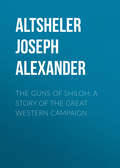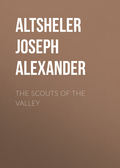
Altsheler Joseph Alexander
The Guns of Bull Run: A Story of the Civil War's Eve
"I don't know you and you don't know me, but if I could I'd give you a whole lake in return for this. Harry, what are our chances?"
"I don't know. We've lost one battle, but we may have time to win another. Jackson and those Virginians of his seem able to stand anything. Up, boys, the battle is on us again!"
The charge swept almost to their feet, but it was driven back, and then came a momentary lull, not a cessation of the battle, but merely a sinking, as if the combatants were gathering themselves afresh for a new and greater effort. It was two o'clock in the afternoon, and the fierce July sun was at its zenith, pouring its burning rays upon both armies, alike upon the living and upon the dead who were now so numerous.
The lull was most welcome to the men in gray. Some fresh regiments sent by Johnston had come already, and they hoped for more, but whether they came or not, the army must stand. The brigades were massed heavily around the Henry house with that of Jackson standing stern and indomitable, the strongest wall against the foe. His fame and his spirit were spreading fast over the field.
The lull was brief, the whole Northern army, its lines reformed, swept forward in a half curve, and the Southern army sent forth a stream of shells and bullets to meet it. The brigades of Jackson and Sherman, indomitable foes, met face to face and swept back and forth over the ground, which was littered with their fallen. Everywhere the battle assumed a closer and fiercer phase. Hampton, who had come just in time with his guns, went down wounded badly. Beauregard himself was wounded slightly, and so was Jackson, hit in the hand. Many distinguished officers were killed.
The whole Northern army was driven back four times, and it came a fifth time to be repulsed once more. In the very height of the struggle Harry caught a glimpse in front of them of a long horizontal line of red, like a gleaming ribbon.
"It's those Zouaves!" cried Langdon. "Shoot their pants!"
He did not mean it as a jest. The words just jumped out, and true to their meaning the Invincibles fired straight at that long line of red, and then reloading fired again. The Zouaves were cut to pieces, the field was strewed with their brilliant uniforms. A few officers tried to bring on the scattered remnants, but two regiments of regulars, sweeping in between and bearing down on the Invincibles, saved them from extermination.
The Invincibles would have suffered the fate they had dealt out to the Zouaves, but fresh regiments came to their help and the regulars were driven back. Sherman and Jackson were still fighting face to face, and Sherman was unable to advance. Howard hurled a fresh force on the men in gray. Bee and Bartow, who had done such great deeds earlier in the day, were both killed. A Northern force under Heintzelman, converging for a flank attack, was set upon and routed by the Southerners, who put them all to flight, captured three guns and took the Robinson house.
Fortune, nevertheless, still seemed to favor the North. The Southerners had barely held their positions around the Henry house. Most of their cannon were dismounted. Hundreds had dropped from exhaustion. Some had died from heat and excessive exertion. The mortality among the officers was frightful. There were few hopeful hearts in the Southern army.
It was now three o'clock in the afternoon and Beauregard, through his glasses, saw a great column of dust rising above the tops of the trees. His experience told him that it must be made by marching troops, but what troops were they, Northern or Southern? In an agony of suspense he appealed to the generals around him, but they could tell nothing. He sent off aides at a gallop to see, but meanwhile he and his generals could only wait, while the column of dust grew broader and broader and higher and higher. His heart sank like a plummet in a pool. The cloud was on the Federal flank and everything indicated that it was the army of Patterson, marching from the Valley of Virginia.
Harry and his comrades had also seen the dust, and they regarded it anxiously. They knew as well as any general present that their fate lay within that cloud.
"It's coming fast, and it's growing faster," said Harry. "I've got so used to the roar of this battle that it seems to me alien sounds are detached from it, and are heard easily. I can hear the rumble of cannon wheels in that cloud."
"Then tell us, Harry," said Langdon, "is it a Northern rumble or a Southern rumble that you hear?"
Harry laughed.
"I'll admit it's a good deal of a fancy," he said.
Arthur St. Clair suddenly leaped high in the air, and uttered at the very top of his voice the wild note of the famous rebel yell.
"Look at the flags aloft in that cloud of dust! It's the Star and Bars! God bless the Bonnie Blue Flag! They are our own men coming, and coming in time!"
Now the battle flags appeared clearly through the dust, and the great rebel yell, swelling and triumphant, swept the whole Southern line. It was the remainder of Johnston's Army of the Shenandoah. It had slipped away from Patterson, and all through the burning day it had been marching steadily toward the battlefield, drummed on by the thudding guns. Johnston, the silent and alert, was himself with them now, and aflame with zeal they were advancing on the run straight for the heart of the Northern army.
Kirby Smith, one of Harry's own Kentucky generals, was in the very van of the relieving force. A man after Stonewall Jackson's own soul, he rushed forward with the leading regiments and they hurled themselves bodily upon the Northern flank.
The impact was terrible. Smith fell wounded, but his men rushed on and the men behind also threw themselves into the battle. Almost at the same instant Jubal Early, who had made a circuit with a strong force, hurled it upon the side of the Northern army. The brave troops in blue were exhausted by so many hours of fierce fighting and fierce heat. Their whole line broke and began to fall back. The Southern generals around the Henry house saw it and exulted. Swift orders were sent and the bugles blew the charge for the men who had stood so many long and bitter hours on the defense.
"Now, Invincibles, now!" cried Colonel Leonidas Talbot. "Charge home, just once, my boys, and the victory is ours!"
Covered with dust and grime, worn and bleeding with many wounds, but every heart beating triumphantly, what was left of the Invincibles rose up and followed their leader. Harry was conscious of a flame almost in his face and of whirling clouds of smoke and dust. Then the entire Southern army burst upon the confused Northern force and shattered it so completely that it fell to pieces.
The bravest battle ever fought by men, who, with few exceptions, had not smelled the powder of war before, was lost and won.
As the Southern cannon and rifles beat upon them, the Northern army, save for the regulars and the cavalry, dissolved. The generals could not stem the flood. They rushed forward in confused masses, seeking only to save themselves. Whole regiments dashed into the fords of Bull Run and emerged dripping on the other side. A bridge was covered with spectators come out from Washington to see the victory, many of them bringing with them baskets of lunch. Some were Members of Congress, but all joined in the panic and flight, carrying to the capital many untrue stories of disaster.
A huge mass of fleeing men emerged upon the Warrenton turnpike, throwing away their weapons and ammunition that they might run the faster. It was panic pure and simple, but panic for the day only. For hours they had fought as bravely as the veterans of twenty battles, but now, with weakened nerves, they thought that an overwhelming force was upon them. Every shell that the Southern guns sent among them urged them to greater speed. The cavalry and little force of regulars covered the rear, and with firm and unbroken ranks retreated slowly, ready to face the enemy if he tried pursuit.
But the men in gray made no real pursuit. They were so worn that they could not follow, and they yet scarcely believed in the magnitude of their own victory, snatched from the very jaws of defeat. Twenty-eight Northern cannon and ten flags were in their hands, but thousands of dead and wounded lay upon the field, and night was at hand again, close and hot.
Harry turned back to the little plateau where those that were left of the Invincibles were already kindling their cooking fires. He looked for his two comrades and recognized them both under their masks of dust and powder.
"Are you hurt, Tom?" he said to Langdon.
"No, and I'm going to sleep in the White House at Washington after all."
"And you, Arthur?"
"There's a red line across my wrist, where a bullet passed, but it's nothing. Listen, what do you think of that, boys?"
A Southern band had gathered in the edge of the wood and was playing a wild thrilling air, the words of which meant nothing, but the tune everything:
"In Dixie's land
I'll take my stand,
To live and die for Dixie.
Look away! Look away!
Look away down South in Dixie."
"So we have taken their tune from them and made it ours!" St. Clair exclaimed jubilantly. "After all, it really belonged to us! We'll play it through the streets of Washington."
But Colonel Leonidas Talbot, who stood close by, raised his hand warningly.
"Boys," he said, "this is only the beginning."







